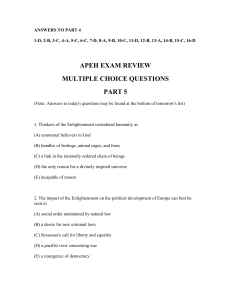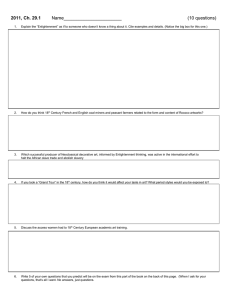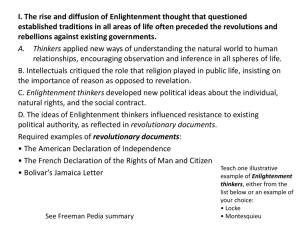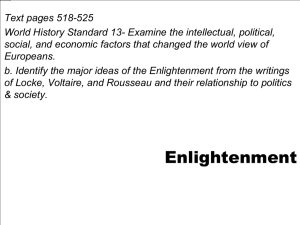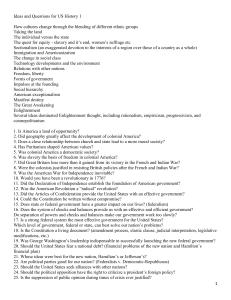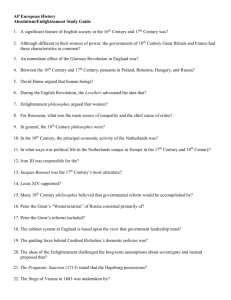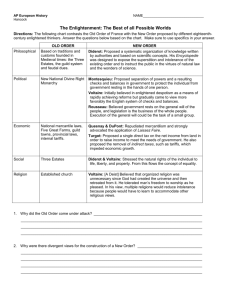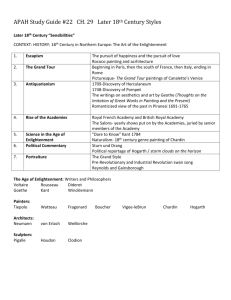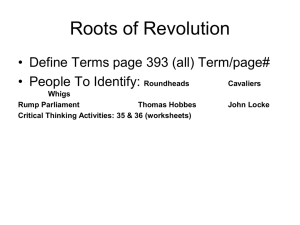APEH EXAM REVIEW MULTIPLE CHOICE QUESTIONS PART 5
advertisement
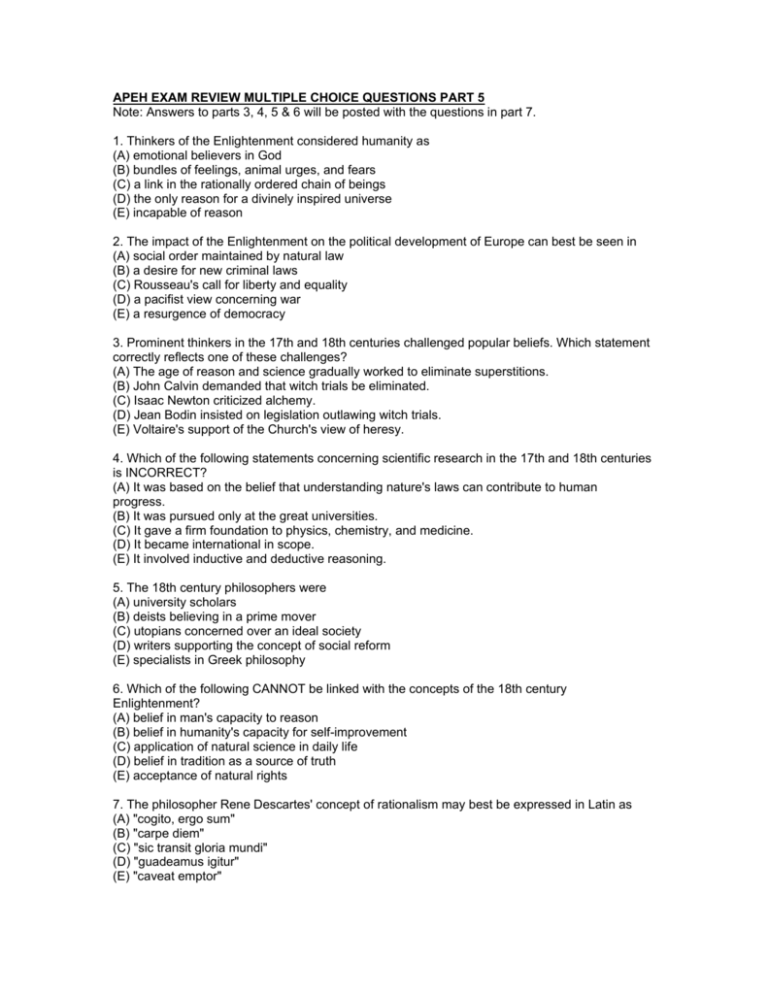
APEH EXAM REVIEW MULTIPLE CHOICE QUESTIONS PART 5 Note: Answers to parts 3, 4, 5 & 6 will be posted with the questions in part 7. 1. Thinkers of the Enlightenment considered humanity as (A) emotional believers in God (B) bundles of feelings, animal urges, and fears (C) a link in the rationally ordered chain of beings (D) the only reason for a divinely inspired universe (E) incapable of reason 2. The impact of the Enlightenment on the political development of Europe can best be seen in (A) social order maintained by natural law (B) a desire for new criminal laws (C) Rousseau's call for liberty and equality (D) a pacifist view concerning war (E) a resurgence of democracy 3. Prominent thinkers in the 17th and 18th centuries challenged popular beliefs. Which statement correctly reflects one of these challenges? (A) The age of reason and science gradually worked to eliminate superstitions. (B) John Calvin demanded that witch trials be eliminated. (C) Isaac Newton criticized alchemy. (D) Jean Bodin insisted on legislation outlawing witch trials. (E) Voltaire's support of the Church's view of heresy. 4. Which of the following statements concerning scientific research in the 17th and 18th centuries is INCORRECT? (A) It was based on the belief that understanding nature's laws can contribute to human progress. (B) It was pursued only at the great universities. (C) It gave a firm foundation to physics, chemistry, and medicine. (D) It became international in scope. (E) It involved inductive and deductive reasoning. 5. The 18th century philosophers were (A) university scholars (B) deists believing in a prime mover (C) utopians concerned over an ideal society (D) writers supporting the concept of social reform (E) specialists in Greek philosophy 6. Which of the following CANNOT be linked with the concepts of the 18th century Enlightenment? (A) belief in man's capacity to reason (B) belief in humanity's capacity for self-improvement (C) application of natural science in daily life (D) belief in tradition as a source of truth (E) acceptance of natural rights 7. The philosopher Rene Descartes' concept of rationalism may best be expressed in Latin as (A) "cogito, ergo sum" (B) "carpe diem" (C) "sic transit gloria mundi" (D) "guadeamus igitur" (E) "caveat emptor" 8. Spinoza's ethical philosophy is contained in which of the following statements? (A) Reason is the only infallible guide to wisdom. (B) Understanding the harmony of nature is the perfect good. (C) The universe is a machine governed by laws which man cannot override. (D) There is no such thing as original sin (E) God does not exist. 9. In his work Leviathan, Thomas Hobbes maintained that (A) the future is bright with promise, if men abandon old superstitions (B) man has a perpetual desire for power (C) God alone is the source of knowledge (D) reality is a myth (E) humanity is inherently good 10. John Locke's approach to knowledge is stated in which of the following? (A) There are no self-evident truths. (B) Only divinely inspired reason can be true. (C) Reason has the power to form a general body of truth. (D) One must directly observe nature to discover its laws. (E) Natural rights do not exist. 11. John Locke's Treatise on Civil Government proposed a political philosophy which was used to justify the (A) American Revolution (B) Thirty Years War (C) Revolutions of 1848 (D) Revolution of 1830 (E) Seven Years' War 12. According to Locke, if there is evil in the world it is the result of (A) human nature (B) divine plan (C) man's environment (D) original sin (E) natural law 13. Which of the following of the Enlightenment thinkers was particularly interested in education? (A) Voltaire (B) Diderot (C) Montesquieu (D) Rousseau (E) Condorcet 14. Newton's view of the physical universe encompassed (A) an incomprehensible void (B) a divine order and plan (C) a machine of perfect order (D) an irrational agglomeration (E) a cosmos based upon the Ptolemaic plan 15. The German philosopher Gotthold Lessing (1729-1781) was convinced that (A) the Aryan race was a superior one (B) no one religion had a monopoly of truth (C) man is the root of all evil (D) man's life is brutish, nasty, and short power was to be glorified
